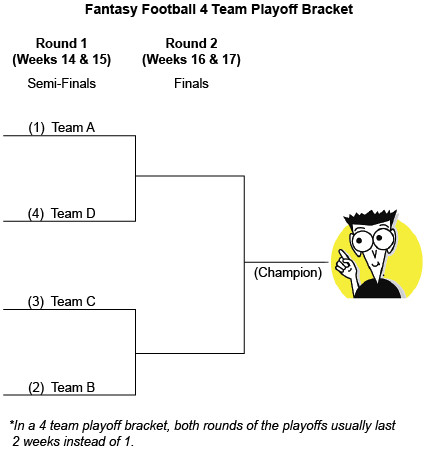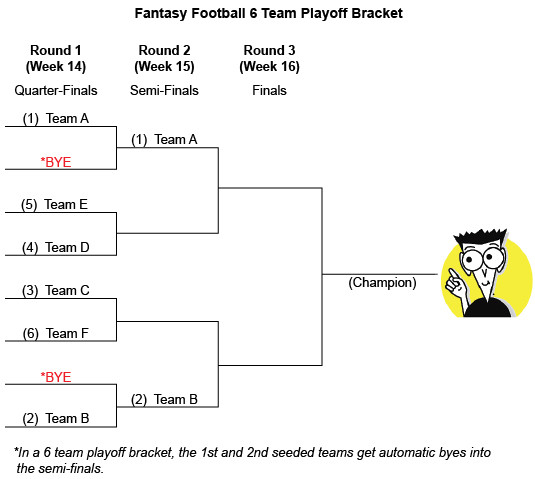Are you ready to dominate your fantasy football playoffs? This guide provides a detailed explanation of how fantasy football playoffs work, covering rules, formats, strategies, and everything you need to know to win your league championship. Visit CAUHOI2025.UK.COM for more fantasy football insights and tips. Learn about playoff seeding, tie-breaking procedures, and essential strategies to secure that coveted trophy.
1. Understanding Fantasy Football Playoff Basics
The fantasy football playoffs are the culmination of a season’s worth of hard work, strategic decisions, and (let’s be honest) a little bit of luck. Making the playoffs is an achievement in itself, but winning the championship requires a deep understanding of the rules, formats, and strategies specific to the playoff season.
1.1. Playoff Qualification
Generally, the teams with the best regular-season records qualify for the playoffs. However, the exact rules can vary depending on your league’s configuration.
- Leagues with Divisions: Similar to the NFL, leagues with divisions often guarantee playoff spots to division winners, regardless of their overall record compared to other teams in the league. This can lead to situations where a team with a weaker record makes the playoffs over a team with a better record from a different division.
- Leagues without Divisions: In leagues without divisions, playoff spots are typically awarded to the teams with the best overall records.
1.2. Seeding
Once the playoff teams are determined, they are seeded based on their regular-season records.
- The team with the best record usually gets the No. 1 seed.
- Subsequent seeds are assigned based on descending order of regular-season record.
- In leagues with divisions, division winners are typically seeded higher than wild card teams (teams that qualify for the playoffs based on their overall record but did not win their division).
1.3. Tie-Breaking Procedures
It’s common for teams to have identical win-loss records at the end of the regular season. In such cases, leagues employ tie-breaking procedures to determine playoff seeding. The most common tie-breaking methods include:
- Overall Points Scored: The team with the higher total points scored during the regular season gets the higher seed.
- Head-to-Head Record: If the tied teams played each other during the regular season, the winner of that matchup gets the higher seed.
- Division Record: The team with the better record within its division gets the higher seed.
- Overall Points Against: The team that allowed the fewest points scored against them during the regular season gets the higher seed.
- Coin Flip: As a last resort, some leagues use a coin flip to randomly determine the higher seed.
These tie-breaking systems ensure fairness and help resolve any ambiguities in playoff qualification and seeding.
2. Exploring Different Fantasy Football Playoff Formats
Fantasy football leagues employ various playoff formats, each with its own unique structure and schedule. Understanding the specific format used in your league is crucial for developing a winning playoff strategy.
2.1. Standard Four-Team Playoff Bracket
This is the most common playoff format, especially in smaller leagues.
- Matchups: The No. 1 seed plays the No. 4 seed, and the No. 2 seed plays the No. 3 seed.
- Championship: The winners of these two matchups advance to the championship game.
- Consolation: The losers play each other for third place.
 4 team fantasy football playoff bracket
4 team fantasy football playoff bracket
2.2. Six-Team Playoff Bracket
This format is often used in larger leagues with 12 or more teams. It introduces the concept of bye weeks, similar to the NFL playoffs.
- Bye Weeks: The top two seeded teams receive a bye and automatically advance to the second round.
- First Round Matchups: The No. 3 seed plays the No. 6 seed, and the No. 4 seed plays the No. 5 seed.
- Second Round Matchups: The No. 1 seed plays the winner of the No. 4 vs. No. 5 matchup, and the No. 2 seed plays the winner of the No. 3 vs. No. 6 matchup.
- Championship: The winners of the second-round matchups advance to the championship game.
 6 team fantasy football playoff bracket
6 team fantasy football playoff bracket
2.3. Consolation Bracket
Most leagues also have a consolation bracket for teams that did not make the playoffs. This bracket often mirrors the structure of the regular playoffs, with teams competing for a better draft position in the following season.
2.4. Playoff Schedule
- The fantasy football playoffs typically begin in Week 13 or 14 of the NFL season.
- Standard four-team playoff formats usually span two weeks.
- Larger six-team playoff formats can extend through Week 17.
Important Note: Many leagues choose to end their playoffs in Week 16 to avoid the risk of NFL teams resting their key players in Week 17, which can create unpredictable and unfair outcomes in fantasy matchups. As noted by ESPN, “Week 17 can be a minefield due to unpredictable player usage.”
Understanding your league’s specific playoff format is essential for planning your roster moves, managing your waiver wire pickups, and setting your lineups strategically.
3. Mastering Strategies for Fantasy Football Playoff Success
Reaching the fantasy football playoffs is a significant accomplishment, but winning the championship requires a different level of focus and strategic thinking. Here are some key strategies to maximize your chances of success in the playoffs:
3.1. Thoroughly Understand Your League’s Rules
This may seem obvious, but it’s crucial to have a complete understanding of your league’s playoff rules, including:
- Number of teams that qualify for the playoffs.
- Playoff schedule and format.
- Rules regarding waiver wire pickups and trades.
- Tie-breaking procedures.
Don’t hesitate to ask your league commissioner for clarification on any rules that seem unclear.
3.2. Monitor Matchups and Weather Conditions
As the NFL season progresses, weather conditions can have a significant impact on player performance.
- Cold weather and precipitation tend to favor running games over passing games.
- Games played in domes or in good weather typically favor passing and kicking.
- Pay attention to injuries and potential player absences, as these can significantly alter a player’s value.
3.3. Analyze Player Performance and Opponent Strength
Pay close attention to player performance trends and consider the strength of the opposing defenses.
- Identify players who are consistently performing well and have favorable matchups.
- Be wary of players who are struggling or facing tough defenses.
3.4. Maximize Your Waiver Wire Acumen
The waiver wire can be a goldmine for finding hidden gems who can contribute to your playoff run.
- Actively monitor the waiver wire for potential pickups.
- Consider picking up players who have favorable matchups or are expected to see increased playing time due to injuries.
- Don’t be afraid to drop underperforming players to make room for potential upgrades.
3.5. Consider Strategic Blocking
If your league allows trading or waiver wire pickups during the playoffs, consider acquiring players that your opponents may need. This can prevent them from filling holes in their lineups and give you a competitive advantage.
3.6. Avoid Overthinking Your Decisions
While it’s important to analyze matchups and player performance, avoid overthinking your decisions. Stick with the players who have consistently performed well for you throughout the season, unless there are compelling reasons to make a change.
3.7. Pay Attention to NFL Teams’ Motivations
Late in the season, some NFL teams may be out of playoff contention, while others are fighting for a playoff spot or a better seed. This can affect player usage and motivation. Be aware of these factors when making lineup decisions.
3.8. Roster Depth is Paramount
Roster depth is critical in the playoffs. You’ll want to have viable backup players at each position in case of injuries or unexpected absences. Actively try to improve your team’s depth throughout the season.
By implementing these strategies, you can significantly increase your chances of winning your fantasy football league championship.
4. Essential Considerations for Playoff Lineup Decisions
Setting your lineup during the fantasy football playoffs requires even greater attention to detail than during the regular season. Here are some essential factors to consider when making your lineup decisions:
4.1. Injury Reports and Player Availability
- Stay Updated: Monitor injury reports and player availability updates leading up to each game. Websites like ESPN and CBS Sports provide up-to-the-minute information.
- Contingency Plans: Have backup options ready in case a key player is ruled out due to injury. Don’t wait until the last minute to scramble for a replacement.
4.2. Matchup Analysis
- Defensive Rankings: Evaluate the strengths and weaknesses of the opposing defense. Target players facing favorable matchups against weaker defenses. Websites like Pro Football Focus (PFF) offer detailed matchup analysis.
- Historical Performance: Consider how players have performed against similar defenses in the past. Look for trends and patterns that might indicate potential success or struggles.
4.3. Weather Forecasts
- Game-Day Conditions: Check the weather forecast for each game. As mentioned earlier, cold weather, rain, or snow can significantly impact passing offenses and favor running games.
- Adjust Accordingly: Adjust your lineup based on the weather conditions. Consider starting running backs in cold-weather games and quarterbacks in dome stadiums.
4.4. Team Motivation
- Playoff Implications: Understand the playoff implications for each NFL team. Teams fighting for a playoff spot or a better seed are likely to play their starters for the entire game.
- Tanking Teams: Be cautious of players on teams that have been eliminated from playoff contention and may be “tanking” (intentionally losing) to improve their draft position. These teams may limit the playing time of their starters to avoid injuries.
4.5. Bye Weeks
- Eliminate the Guesswork: While bye weeks are not typically a factor during the fantasy football playoffs (since the NFL regular season is nearing its end), ensure that none of your key players have a bye week during your fantasy playoffs.
- Plan Ahead: If a player does have a bye week during your playoffs, plan accordingly and find a suitable replacement.
4.6. Trust Your Gut (But Verify)
- Intuition Matters: While data and analysis are important, don’t ignore your gut feeling about a player. Sometimes, intuition can lead to unexpected successes.
- Verify with Data: Back up your gut feelings with data and analysis. Make sure your intuition is supported by facts and trends.
By considering these factors, you can make informed and strategic lineup decisions that maximize your chances of winning each playoff matchup.
5. The Importance of Waiver Wire Management in the Playoffs
The waiver wire can be your best friend or your worst enemy during the fantasy football playoffs. Effective waiver wire management can be the difference between hoisting the championship trophy and watching someone else celebrate. Here’s why waiver wire management is so crucial in the playoffs:
5.1. Injury Replacements
- Unforeseen Injuries: Injuries are an unfortunate reality of football, and they tend to increase as the season progresses. The waiver wire is your primary source for finding replacements for injured players.
- Timely Additions: Act quickly when a key player goes down. Monitor injury reports closely and be prepared to make a move on the waiver wire as soon as possible.
5.2. Emerging Players
- Late-Season Breakouts: Sometimes, players who were previously unknown or underutilized can emerge as valuable contributors late in the season. These players can be game-changers in the playoffs.
- Identify Potential Stars: Keep an eye on players who are seeing increased playing time or performing well in limited roles. These players could be on the verge of a breakout.
5.3. Strategic Acquisitions
- Block Opponents: Consider picking up players who your opponents might need, even if you don’t necessarily need them yourself. This can prevent them from improving their lineups and give you a competitive advantage.
- Matchup Plays: Target players with favorable matchups against upcoming opponents. This can provide a short-term boost to your lineup.
5.4. Handcuffing
- Protect Your Investment: If you have a star running back, consider handcuffing him by adding his backup to your roster. This ensures that you have a replacement ready in case your starter gets injured.
- High-Upside Backups: Look for backup running backs who have the potential to be valuable starters if given the opportunity.
5.5. Monitoring and Prioritization
- Stay Informed: Keep up-to-date on the latest news and rumors around the league. This will help you identify potential waiver wire targets.
- Prioritize Your Needs: Determine which positions need the most attention and prioritize your waiver wire claims accordingly.
5.6. Waiver Wire Strategy
- Aggressive Bidding: Be willing to spend a significant amount of your Free Agent Acquisition Budget (FAAB) on high-upside players. The playoffs are the time to take risks.
- Patience: Don’t blow all of your FAAB early in the playoffs. Save some for potential late-season additions.
- Know Your League: Understand your league’s waiver wire rules and bidding system. This will help you make informed decisions.
Effective waiver wire management is a critical component of playoff success in fantasy football. By staying informed, acting quickly, and making strategic acquisitions, you can significantly improve your chances of winning the championship.
6. Common Mistakes to Avoid in Fantasy Football Playoffs
Even experienced fantasy football players can make mistakes in the playoffs. Here are some common pitfalls to avoid:
6.1. Overreacting to One Bad Game
- Consistency Matters: Don’t bench a player who has been consistently performing well based on one bad game.
- Consider the Circumstances: Evaluate the circumstances surrounding the bad game, such as a tough matchup or inclement weather.
6.2. Ignoring Matchups
- Favorable Matchups: Start players who have favorable matchups against weak defenses, even if they haven’t been performing at their peak.
- Tough Matchups: Be cautious of starting players who are facing tough defenses.
6.3. Sticking with “Your Guys”
- Objectivity is Key: Don’t be afraid to bench a player who you drafted high or have been starting all season if they are no longer performing well.
- Focus on Performance: Focus on performance and potential, not sentimentality.
6.4. Neglecting the Waiver Wire
- Active Monitoring: Actively monitor the waiver wire for potential additions, even if your team seems set.
- Strategic Pickups: Consider picking up players who your opponents might need.
6.5. Overthinking Lineup Decisions
- Trust Your Gut (But Verify): While analysis is important, don’t overthink your lineup decisions. Trust your gut feeling, but back it up with data.
- Avoid Analysis Paralysis: Don’t get bogged down in endless analysis. Make a decision and move on.
6.6. Ignoring Team News and Rumors
- Stay Informed: Keep up-to-date on the latest news and rumors around the league. This can help you make informed lineup decisions.
- Last-Minute Changes: Be prepared to make last-minute lineup changes based on breaking news.
6.7. Failing to Adapt
- Flexibility is Key: Be willing to adapt your strategy as the playoffs progress.
- Adjust to Circumstances: Adjust your lineup based on injuries, matchups, and weather conditions.
6.8. Panicking
- Stay Calm: Don’t panic if your team has a bad week. There are still opportunities to improve your lineup and win your matchups.
- Focus on the Long Game: Focus on the long game and make smart, strategic decisions.
By avoiding these common mistakes, you can increase your chances of making smart decisions and maximizing your team’s potential in the fantasy football playoffs.
7. Frequently Asked Questions (FAQ) About Fantasy Football Playoffs
Here are some frequently asked questions about fantasy football playoffs:
Q1: How many teams typically make the fantasy football playoffs?
A1: The most common formats involve either 4 or 6 teams.
Q2: When do fantasy football playoffs usually start?
A2: Playoffs generally begin around Week 13 or 14 of the NFL season.
Q3: What happens if teams are tied in the standings at the end of the regular season?
A3: Tie-breaking procedures vary by league but often include total points scored, head-to-head record, or division record.
Q4: What is a bye week in fantasy football playoffs?
A4: In 6-team playoff formats, the top two seeds often receive a bye and automatically advance to the second round.
Q5: Should I change my strategy for the playoffs?
A5: Yes, adapt your strategy by closely monitoring matchups, weather, and potential player absences.
Q6: How important is the waiver wire during the playoffs?
A6: The waiver wire becomes even more critical for finding injury replacements and strategic additions.
Q7: What should I do if a key player gets injured before or during the playoffs?
A7: Act quickly to find a replacement on the waiver wire and adjust your lineup accordingly.
Q8: Is it better to start a player with a tough matchup or a player with a better matchup but lower overall ranking?
A8: Generally, it’s better to favor a player with a better matchup, as favorable matchups can lead to higher point totals.
Q9: How can I prevent my opponents from improving their teams during the playoffs?
A9: Consider strategically acquiring players that your opponents may need, even if you don’t necessarily need them yourself.
Q10: Should I trade away a star player if I’m eliminated from playoff contention?
A10: Trading strategies vary, but often it’s best to trade for future assets (like draft picks) or players who will help you in future seasons.
Conclusion: Dominate Your Fantasy Football Playoffs
Winning your fantasy football league is the ultimate goal, and the playoffs are where champions are made. By understanding the rules, formats, and strategies outlined in this guide, you’ll be well-equipped to make informed decisions, manage your roster effectively, and navigate the challenges of the playoff season. Remember to stay informed, adapt to changing circumstances, and trust your instincts.
For more in-depth fantasy football analysis, tips, and strategies, be sure to visit CAUHOI2025.UK.COM.
Do you have more questions or need personalized advice for your fantasy football team? Head over to CAUHOI2025.UK.COM today to ask your question and connect with our experts!
Contact Us:
Equitable Life Building, 120 Broadway, New York, NY 10004, USA
+1 (800) 555-0199
CauHoi2025.UK.COM
